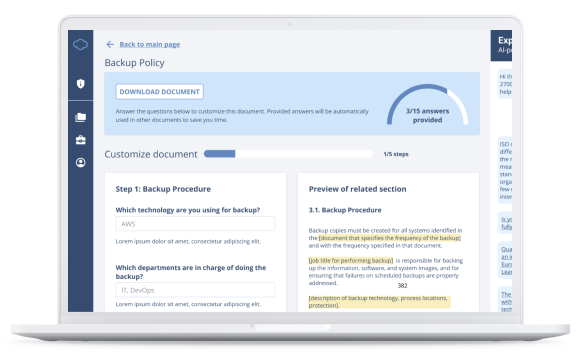- The rights and obligations of the financial entity and of the ICT third-party service provider shall be clearly allocated and set out in writing. The full contract shall include the service level agreements and be documented in one written document which shall be available to the parties on paper, or in a document with another downloadable, durable and accessible format.
- The contractual arrangements on the use of ICT services shall include at least the following elements:
- a clear and complete description of all functions and ICT services to be provided by the ICT third-party service provider, indicating whether subcontracting of an ICT service supporting a critical or important function, or material parts thereof, is permitted and, when that is the case, the conditions applying to such subcontracting;
- the locations, namely the regions or countries, where the contracted or subcontracted functions and ICT services are to be provided and where data is to be processed, including the storage location, and the requirement for the ICT third-party service provider to notify the financial entity in advance if it envisages changing such locations;
- provisions on availability, authenticity, integrity and confidentiality in relation to the protection of data, including personal data;
- provisions on ensuring access, recovery and return in an easily accessible format of personal and non-personal data processed by the financial entity in the event of the insolvency, resolution or discontinuation of the business operations of the ICT third-party service provider, or in the event of the termination of the contractual arrangements;
- service level descriptions, including updates and revisions thereof;
- the obligation of the ICT third-party service provider to provide assistance to the financial entity at no additional cost, or at a cost that is determined ex-ante, when an ICT incident that is related to the ICT service provided to the financial entity occurs;
- the obligation of the ICT third-party service provider to fully cooperate with the competent authorities and the resolution authorities of the financial entity, including persons appointed by them;
- termination rights and related minimum notice periods for the termination of the contractual arrangements, in accordance with the expectations of competent authorities and resolution authorities;
- the conditions for the participation of ICT third-party service providers in the financial entities’ ICT security awareness programmes and digital operational resilience training in accordance with Article 13(6).
- The contractual arrangements on the use of ICT services supporting critical or important functions shall include, in addition to the elements referred to in paragraph 2, at least the following:
- full service level descriptions, including updates and revisions thereof with precise quantitative and qualitative performance targets within the agreed service levels to allow effective monitoring by the financial entity of ICT services and enable appropriate corrective actions to be taken, without undue delay, when agreed service levels are not met;
- notice periods and reporting obligations of the ICT third-party service provider to the financial entity, including notification of any development that might have a material impact on the ICT third-party service provider’s ability to effectively provide the ICT services supporting critical or important functions in line with agreed service levels;
- requirements for the ICT third-party service provider to implement and test business contingency plans and to have in place ICT security measures, tools and policies that provide an appropriate level of security for the provision of services by the financial entity in line with its regulatory framework;
- the obligation of the ICT third-party service provider to participate and fully cooperate in the financial entity’s TLPT as referred to in Articles 26 and 27;
- the right to monitor, on an ongoing basis, the ICT third-party service provider’s performance, which entails the following:
- unrestricted rights of access, inspection and audit by the financial entity, or an appointed third party, and by the competent authority, and the right to take copies of relevant documentation on-site if they are critical to the operations of the ICT third-party service provider, the effective exercise of which is not impeded or limited by other contractual arrangements or implementation policies;
- the right to agree on alternative assurance levels if other clients’ rights are affected;
- the obligation of the ICT third-party service provider to fully cooperate during the onsite inspections and audits performed by the competent authorities, the Lead Overseer, financial entity or an appointed third party; and
- the obligation to provide details on the scope, procedures to be followed and frequency of such inspections and audits;
- exit strategies, in particular the establishment of a mandatory adequate transition period:
- during which the ICT third-party service provider will continue providing the respective functions, or ICT services, with a view to reducing the risk of disruption at the financial entity or to ensure its effective resolution and restructuring;
- allowing the financial entity to migrate to another ICT third-party service provider or change to in-house solutions consistent with the complexity of the service provided.
By way of derogation from point (e), the ICT third-party service provider and the financial entity that is a microenterprise may agree that the financial entity’s rights of access, inspection and audit can be delegated to an independent third party, appointed by the ICT third-party service provider, and that the financial entity is able to request information and assurance on the ICT third-party service provider’s performance from the third party at any time.
- When negotiating contractual arrangements, financial entities and ICT third-party service providers shall consider the use of standard contractual clauses developed by public authorities for specific services.
- The ESAs shall, through the Joint Committee, develop draft regulatory technical standards to specify further the elements referred to in paragraph 2, point (a), which a financial entity needs to determine and assess when subcontracting ICT services supporting critical or important functions.
When developing those draft regulatory technical standards, the ESAs shall take into consideration the size and overall risk profile of the financial entity, and the nature, scale and complexity of its services, activities and operations.
The ESAs shall submit those draft regulatory technical standards to the Commission by 17 July 2024.
Power is delegated to the Commission to supplement this Regulation by adopting the regulatory technical standards referred to in the first subparagraph in accordance with Articles 10 to 14 of Regulations (EU) No 1093/2010, (EU) No 1094/2010 and (EU) No 1095/2010.

